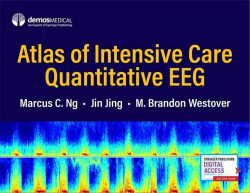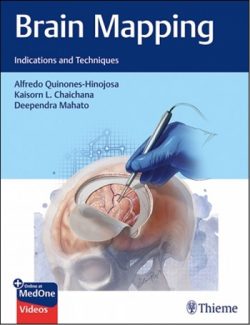This superbly illustrated 3 volume textbook, endorsed by the European Society of Neuroradiology, explains in detail the clinical importance of neuroradiology in complementing history taking and physical examination during the workup of patients suspected of having neurological, neurosurgical, or psychiatric disorders. The role of imaging of the brain and spinal cord is described across the full range of relevant conditions, including, cerebrovascular diseases, trauma, CSF disorders, developmental malformations, inflammatory diseases, epilepsy, tumors and tumor-like conditions, neurodegenerative diseases, metabolic conditions and neuromuscular disorders. The structured approach to imaging and image analysis will ensure that the book is an invaluable resource for neuroradiologists in training and clinicians alike. Starting from the clinical indication, suggestions for imaging protocols are provided and checklists of common findings and aspects key to interpretation are presented. The book is published within the SpringerReference program, which combines thorough coverage with access to living editions constantly updated via a dynamic peer-review process.
Sections in the Textbook:
Indications, Technique, and Anatomy: Tarek A. Yousry,
Cerebrovascular Diseases: Rüdiger von Kummer,
Trauma: Johan Van Goethem,
CSF Disorders: Charles Romanowski,
Infectious Brain Disease: Majda M. Thurnher,
Inflammatory and Autoimmune Brain Diseases: Alex Rovira,
Epilepsy: Nuria Bargalló,
Tumor and Tumorlike Conditions: Hans Rolf Jäger,
Dementia and Neurodegenerative Diseases: Sven Haller,
Toxic and Acquired Metabolic Conditions: Andrea Falini,
Pediatric Neuroradiology: Andrea Rossi,
Spine and Spinal Cord: Mario Muto,
Peripheral Nervous System and Neuromuscular Disease: Mike Wattjes
Sections: Indications, technique and anatomy; Cerebrovascular diseases; Trauma; Paediatric Neuroradiology; CSF disorders; Spine and spinal cord; Inflammatory and autoimmune brain diseases; Infectious brain disease; Epilepsy; Tumour and tumour-like conditions; Dementia and neurodegenerative diseases; Toxic & metabolic conditions; Peripheral nervous system and Neuromuscular Disease
Frederik Barkhof received his M.D. from VU University, Amsterdam (NL), in 1988, and defended his Ph.D. thesis in 1992, for which he received the Philips Prize for Radiology (1992) and the Lucien Appel Prize for Neuroradiology (1994). Since 2001, he serves as a Full Professor in Neuroradiology in the Department of Radiology and Nuclear Medicine at VUmc. In 2015, he was appointed Full Professor of Neuroradiology at the institutes of Biomedical Engineering and Neurology at UCL in London (UK) to translate novel imaging techniques and became a fellow of the Royal College of Radiology. Professor Barkhof was the Chairman of the Dutch Society of Neuroradiology and the MAGNIMS study group for many years. He leads the Queen Square MS Centre Trial Unit, involved in the analysis of multicenter drug trials. He serves on the editorial boards of Radiology, Brain, Multiple Sclerosis Journal, Neuroradiology, and Neurology. In 2018 he received the John Dystel Prize by the AAN and NMSS for his significant contributions to MS research. In 2019, he became a senior fellow of the ISMRM. Barkhof’s research interests focus on childhood white matter disease, multiple sclerosis (spinal cord MRI, gray matter, atrophy, and histopathology correlations), aging (white matter lesions and microbleeds), and dementia (structural, functional, and molecular MR and PET). He has (co)authored more than 1000 papers referenced in PubMed, and is listed among the 3000 most influential scientists worldwide by Thompson-Reuters. He is the author of the books Neuroimaging in Dementia and Clinical Applications of Functional Brain MRI. Cumulatively, he has received in excess of €25 million in grant money from various national and international funding agencies and has performed contract research for all major pharmaceutical companies, with a cumulative contract value exceeding €15 million. More than 40 Ph.D. students have graduated under his supervision and 3 of them have subsequently attained a full professorship.
Hans Rolf Jäger studied Medicine at the Universities of Freiburg, Germany, and Montpellier, France (as recipient of a bursary from the French government). He obtained his M.D. with “magna cum laude” at the University of Freiburg in 1983. After 3 years in Internal Medicine, he underwent training in Radiology at the Hammersmith Hospital, London, and obtained the Fellowship of the Royal College of Radiologists in 1991. Subsequently, he trained in Neuroradiology at the National Hospital for Neurology and Neurosurgery, Queen Square, London, and in Interventional Neuroradiology with Pierre Lasjaunias at Hôpital Bicêtre, Paris. Rolf Jäger became Consultant Neuroradiologist at the National Hospital for Neurology and Neurosurgery in 1997, with joint academic appointments at the UCL Institute of Neurology, where he was promoted to Full Professor in Neuroradiology in 2014. During the course of his career, Rolf Jäger has been implementing advanced MR imaging techniques, such as gadolinium-based perfusion techniques, hemorrhage-sensitive imaging (T2_ and SWI), carotid plaque imaging, intracranial vessel wall imaging, and ASL perfusion imaging and angiography. He thereby created platforms for clinical translational research, the results of which made seminal contributions to the understanding of disease processes and influenced patient management. His clinical interest and research focus are cerebrovascular diseases, brain tumors, as well as neuro-infection (in particular HIV), and neurodegenerative diseases. He has been the imaging lead of several national and international multicenter clinical trials in these fields with an overall grant funding of £5.6 million. Rolf Jäger has built strong research collaborations with leading academic institutions in Europe, the USA, and South America, and regularly supervises visiting fellows from these institutions. He has supervised 16 Ph.D. students at the UCL Institute of Neurology. He has published 180 peer-reviewed articles, including several publications in the New England Journal of Medicine, Lancet Neurology, and Brain. He has published 1 book and 25 book chapters and is editor of the Neuroimaging Section of Grainger and Allison’s Diagnostic Radiology. Rolf Jäger was Chairman of the Publications Committee of the European Society of Neuroradiology from 2004 to 2009 and has been a regular member of the teaching faculty of the European Course of Neuroradiology, as well as educational speaker at the European Congress of Radiology (ECR) since 2003. As an internationally sought-after speaker. he has given 60 invited talks in the past 5 years.
Majda M. Thurnher is Associate Professor of Radiology at the Medical University of Vienna since 2001. Her primary focus is on neuroradiology, especially CNS infections, demyelinating diseases, and spinal imaging. Her published work includes 70 scientific articles and 40 book chapters. She has contributed as a reviewer and editorial board member to numerous national and international journals, including guest editorship of special issues of European Radiology and Neuroimaging Clinics of North America. She was editorial board member of European Radiology and American Journal of Neuroradiology AJNR, and is currently editorial board member of Neuroradiology, and Associate Editor of Journal of Neuroradiology. She has delivered more than 370 invited lectures at national and international meetings, and has been a regular member of the program planning committees for the European Congress of Radiology (ECR) European Society of Neuroradiology (ESNR) annual meeting, and Co-director of the European Course in Neuroradiology (ECNR). At the ECR 2011, Professor Thurnher gave a prestigious “Pierre and Marie Curie Honorary Lecture.” She has been invited as a Guest Professor at numerous European and American universities, and became the very first recipient of “The Johns Hopkins Milosh Petrovich Travel Grant” in 2008. She was awarded the European School of Radiology “ESOR Teaching Award” in 2013 and 2017. Thurnher is the Honorary Member of several neuroradiological societies. Thurnher has served as President of the European Society of Neuroradiology-Diagnostic and Interventional (ESNR) from 2014 to 2016, and is currently a CEO of the European Board of Neuroradiology (EBNR).
Àlex Rovira is a full-time neuroradiologist, who gained his M.D. in 1983 at the Autonomous University of Barcelona. After formal training in Radiology at Vall d’Hebron University Hospital (Barcelona), he undertook a visiting fellowship at Shands Hospital (Gainesville, University of Florida) in 1989. In 1990, he became staff neuroradiologist at the Section of Neuroradiology at Vall d’Hebron Hospital (Barcelona, Spain). Rovira is Director of the Section of Neuroradiology at University Hospital Vall d’Hebron, Barcelona (Spain). He is also Professor of Radiology and Neuroimmunology at the Autonomous University of Barcelona. He is specialized in diagnostic neuroradiology and head and neck radiology, with particular interest in demyelinating diseases, stroke, neuro-oncology, hepatic encephalopathy, and head and neck tumors. Rovira was past President of the European Society of Neuroradiology, member of the MAGNIMS (European Multicenter Collaborative Research Network on MRI in MS), member of the Executive Committee of the Spanish Society of Radiology, and member of the World Federation of Neuroradiological Societies. He is on the editorial boards of the American Journal of Neuroradiology, Neuroradiology, and the MS Forum, and member of the International Advisory Board on Clinical Trials in MS. He also served as President of the Spanish Society of Neuroradiology (2009–2015), on the Lucien Appel Prize Award Jury of the European Society of Neuroradiology (2006–2012), as Editor of Neuroradiology in the Spanish Journal of Radiology, as Director of the 10th and 11th Cycles of the Pierre Lasjaunias European Course of Neuroradiology (2008–2012), and as Chairman of MAGNIMS (2012–2018). Rovira has authored or coauthored more than 330 articles, 30 book chapters or monographs, and more than 400 invited conference presentations. He has an H-index of 56. He has been invited as Visiting Professor at the University of Toronto, at McGill University (Montreal), at Lysholm Department of Neuroradiology (UCL, London), at Ottawa University, and at the University of North Carolina (Chapel Hill). In 2019, he will become honorary member of the Paulista Society of Radiology and of the Polish Society of Radiology.
Explains the clinical importance of neuroradiology across a wide range of conditions
Features a structured approach to image analysis, including imaging protocols, checklists for reporting and sample reports
Endorsed by the European Society of Neuroradiology – freely available to Full and Junior members
Represents a mandatory text for ECNR students – the next generation of EU neuroradiologists
Contains 13 Sections and 77 chapters in 3 volumes
Explains the clinical importance of neuroradiology across a wide range of conditions
Features a structured approach to image analysis
Endorsed by the European Society of Neuroradiology
Represents a mandatory text for ECNR students – the next generation of EU neuroradiologists





